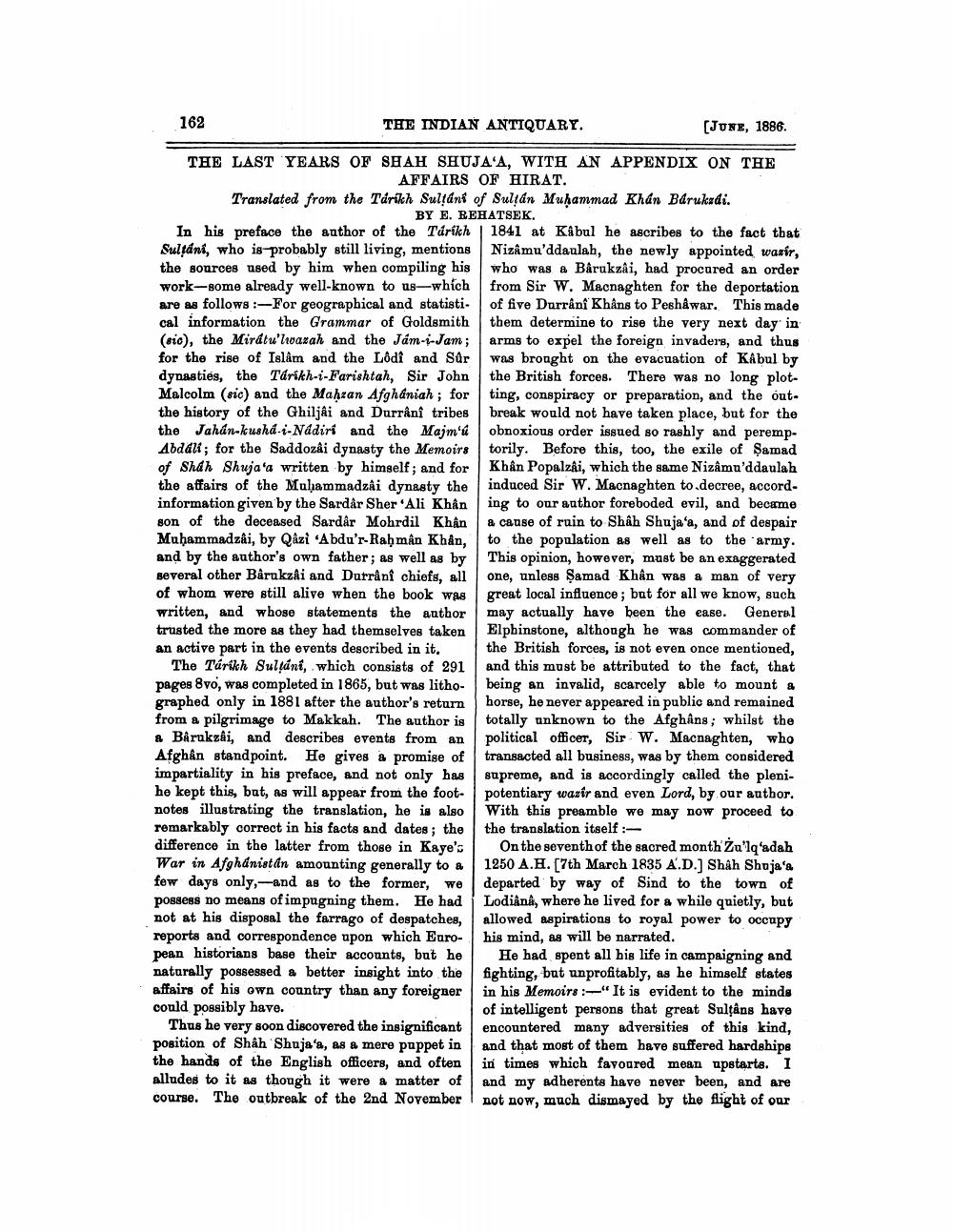________________
162
THE INDIAN ANTIQUARY.
[JUNE, 1886.
THE LAST YEARS OF SHAH SHUJAA, WITH AN APPENDIX ON THE
AFFAIRS OF HIRAT. Translated from the Tarikh Sultáni of Sultan Muhammad Khan Bdrukudi.
BY E. REHATSEK. In his preface the author of the Tarikh 1841 at Kabul he ascribes to the fact that Sultani, who is probably still living, mentions Nizamu'ddaulah, the newly appointed waxir, the sources used by him when compiling his who was a Bárukzâi, had procured an order work-some already well-known to us-which from Sir W. Macnaghten for the deportation are as follows :-For geographical and statisti. of five Durrani Khâns to Peshwar. This made cal information the Grammar of Goldsmith them determine to rise the very next day in (sio), the Mirátu'lwazah and the Jám-j-Jam; arms to expel the foreign invaders, and thus for the rise of Islâm and the Lôdî and Sur was brought on the evacuation of Kabul by dynasties, the Tarikh-i-Farishtah, Sir John the British forces. There was no long plotMalcolm (sic) and the Mahzan Afghániah; for ting, conspiracy or preparation, and the out. the history of the Ghiljai and Durrâni tribes break would not have taken place, but for the the Jahan-kushd-i-Nadiri and the Majm'ú obnoxious order issued so rashly and perempAbdali; for the Saddozâi dynasty the Memoirs torily. Before this, too, the exile of Şamad of Shah Shuja'a written by himself; and for Khân Popalzâi, which the same Nizâmu'ddaulah the affairs of the Muhammadzâi dynasty the induced Sir W. Macnaghten to.decree, accordinformation given by the Sardár Sher Ali Khân ing to our author foreboded evil, and became son of the deceased Sardár Mohrdil Khan a cause of ruin to Shah Shuja'a, and of despair Muhammadzki, by Qazi Abdu'r-Rahman Khan, to the population as well as to the army. and by the author's own father; as well as by This opinion, however, must be an exaggerated Beveral other Barukzâi and Durrani chiefs, all one, unless Samad Khân was a man of very of whom were still alive when the book was great local influence; but for all we know, such written, and whose statements the author may actually have been the case. General trusted the more as they had themselves taken Elphinstone, althongh he was commander of an active part in the events described in it. the British forces, is not even once mentioned,
The Tárikh Sulțáni, which consists of 291 and this must be attributed to the fact, that pages 8vo, was completed in 1865, but was litho- being an invalid, scarcely able to mount & graphed only in 1881 after the author's return horse, he never appeared in public and remained from a pilgrimage to Makkah. The author is totally unknown to the Afghans; whilst the a Barukzki, and describes events from an political officer, Sir W. Macnaghten, who Afghan stand point. He gives a promise of transacted all business, was by them considered impartiality in his preface, and not only has supreme, and is accordingly called the plenihe kept this, but, as will appear from the foot- potentiary wazir and even Lord, by our author. notes illustrating the translation, he is also With this preamble we may now proceed to remarkably correct in his facts and dates; the the translation itself : difference in the latter from those in Kaye's On the seventh of the sacred month'Žu'lq'adah War in Afghanistan amounting generally to a 1250 A.H. [7th March 1835 A.D.) Shah Shuja's few days only, and as to the former, we departed by way of Sind to the town of possess no means of impugning them. He had Lodiana, where he lived for a while quietly, but not at his disposal the farrago of despatches, allowed aspirations to royal power to occupy reports and correspondence upon which Earo his mind, as will be narrated. pean historians base their accounts, but he He had spent all his life in campaigning and naturally possessed a better insight into the fighting, but unprofitably, as he himself states affairs of his own country than any foreigner in his Memoirs :-"It is evident to the minds could possibly have.
of intelligent persons that great Sultans have Thus he very soon discovered the insignificant encountered many adversities of this kind, position of Shah Shuja'a, as a mere puppet in and that most of them have suffered hardships the hands of the English officers, and often in times which favoured mean upstarts. I alludes to it as though it were a matter of and my adherents have never been, and are course. The outbreak of the 2nd November not now, much dismayed by the flight of our




